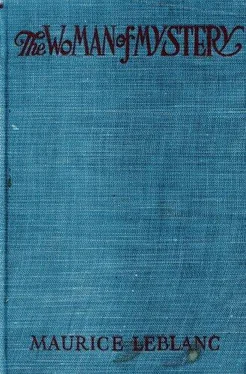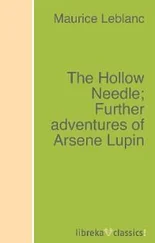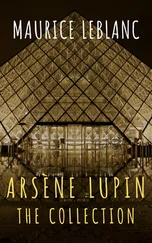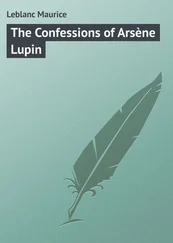Maurice Leblanc - The Woman of Mystery
Здесь есть возможность читать онлайн «Maurice Leblanc - The Woman of Mystery» весь текст электронной книги совершенно бесплатно (целиком полную версию без сокращений). В некоторых случаях можно слушать аудио, скачать через торрент в формате fb2 и присутствует краткое содержание. Жанр: Классический детектив, на английском языке. Описание произведения, (предисловие) а так же отзывы посетителей доступны на портале библиотеки ЛибКат.
- Название:The Woman of Mystery
- Автор:
- Жанр:
- Год:неизвестен
- ISBN:нет данных
- Рейтинг книги:5 / 5. Голосов: 1
-
Избранное:Добавить в избранное
- Отзывы:
-
Ваша оценка:
- 100
- 1
- 2
- 3
- 4
- 5
The Woman of Mystery: краткое содержание, описание и аннотация
Предлагаем к чтению аннотацию, описание, краткое содержание или предисловие (зависит от того, что написал сам автор книги «The Woman of Mystery»). Если вы не нашли необходимую информацию о книге — напишите в комментариях, мы постараемся отыскать её.
The Woman of Mystery — читать онлайн бесплатно полную книгу (весь текст) целиком
Ниже представлен текст книги, разбитый по страницам. Система сохранения места последней прочитанной страницы, позволяет с удобством читать онлайн бесплатно книгу «The Woman of Mystery», без необходимости каждый раз заново искать на чём Вы остановились. Поставьте закладку, и сможете в любой момент перейти на страницу, на которой закончили чтение.
Интервал:
Закладка:
Paul put on a spurt so as to reach the door before they had time to open it. The bare ground enabled him to increase his speed, whereas the men, who were obviously tired, had reduced theirs.
"I've got them, the ruffians!" he murmured. "I shall at last know…"
A second whistle sounded, followed by a guttural shout. He was now within twenty yards of them and could hear them speak.
"I've got them, I've got them!" he repeated, with fierce delight.
And he made up his mind to strike one of them in the face with the barrel of his revolver and to spring at the other's throat.
But, before they even reached the wall, the door was pushed open from the outside and a third man appeared and let them through.
Paul flung away the revolver; and his impetus was such and the effort which he made so great that[Pg 53] he managed to seize the door and draw it to him.
The door gave way. And what he then saw scared him to such a degree that he started backwards and did not even dream of defending himself against this fresh attack. The third man-Oh, hideous nightmare! Could it moreover be anything but a nightmare?-the third ruffian was raising a knife against him; and Paul knew his face… it was a face resembling the one which he had seen before, a man's face and not a woman's, but the same sort of face, undoubtedly the same sort: a face marked by fifteen additional years and by an even harder and more wicked expression, but the same sort of face, the same sort!
And the man stabbed Paul, even as the woman of fifteen years ago, even as she who was since dead had stabbed Paul's father.
Paul Delroze staggered, but rather as the result of the nervous shock caused by the sudden appearance of this ghost of the past; for the blade of the dagger, striking the button on the shoulder-strap of his shooting-jacket, broke into splinters. Dazed and misty-eyed, he heard the sound of the door closing, the grating of the key in the lock and lastly the hum of a motor car starting on the other side of the wall. When Paul recovered from his torpor there was nothing left for him to do. The man and his two confederates were out of reach.
Besides, for the moment he was utterly absorbed[Pg 54] in the mystery of the likeness between the figure from the past and that which he had just seen. He could think of but one thing:
"The Comtesse d'Andeville is dead; and here she is revived under the aspect of a man whose face is the very face which she would have to-day. Is it the face of some relation, of a brother of whom I never heard, a twin perhaps?"
And he reflected:
"After all, am I not mistaken? Am I not the victim of an hallucination, which would be only natural in the crisis through which I am passing? How do I know for certain that there is any connection between the present and the past? I must have a proof."
The proof was ready to his hand; and it was so strong that Paul was not able to doubt for much longer. He caught sight of the remains of the dagger in the grass and picked up the handle. On it four letters were engraved as with a red-hot iron: an H, an E, an R and an M.
H, E, R, M; the first four letters of Hermine!… At this moment, while he was staring at the letters which were to him so full of meaning, at this moment, a moment which Paul was never to forget, the bell of a church nearby began to ring in the most unusual manner: a regular, monotonous, uninterrupted ringing, which sounded at once brisk and unspeakably sinister.
"The tocsin," he muttered to himself, without at[Pg 55]taching the full sense to the word. And he added: "A fire somewhere, I expect."
A few minutes later Paul had succeeded in climbing over the wall by means of the projecting branches of a tree. He found a further stretch of woods, crossed by a forest road. He followed the tracks of a motor car along this road and reached the frontier within an hour.
A squad of German constabulary were sitting round the foot of the frontier post; and he saw a white road with Uhlans trotting along it. At the end of it was a cluster of red roofs and gardens. Was this the little town where his father and he had hired their bicycles that day, the little town of Ebrecourt?
The melancholy bell never ceased. He noticed that the sound came from France; also that another bell was ringing somewhere, likewise in France, and a third from the direction of the Liseron; and all three on the same hurried note, as though sending forth a wild appeal around them.
He repeated, anxiously:
"The tocsin!… The alarm!… And it's being passed on from church to church… Can it mean that…"
But he drove away the terrifying thought. No, his ears were misleading him; or else it was the echo of a single bell thrown back in the hollow valleys and ringing over the plains.
Meanwhile he was gazing at the white road which[Pg 56] issued from the little German town, and he observed that a constant stream of horsemen was arriving there and spreading across-country. Also a detachment of French dragoons appeared on the ridge of a hill. The officer in command scanned the horizon through his field-glasses and then trotted off with his men.
Thereupon, unable to go any farther, Paul walked back to the wall which he had climbed and found that the wall was prolonged around the whole of the estate, including the woods and the park. He learnt besides from an old peasant that it was built some twelve years ago, which explained why Paul had never found the chapel in the course of his explorations along the frontier. Once only, he now remembered, some one had told him of a chapel; but it was one situated inside a private estate; and his suspicions had not been aroused.
While thus following the road that skirted the property, he came nearer to the village of Ornequin, whose church suddenly rose at the end of a clearing in the wood. The bell, which he had not heard for the last moment or two, now rang out again with great distinctness. It was the bell of Ornequin. It was frail, shrill, poignant as a lament and more solemn than a passing-bell, for all its hurry and lightness.
Paul walked towards the sound. A charming village, all aflower with geraniums and Marguerites, stood gathered about its church. Silent groups were[Pg 57] studying a white notice posted on the Mayor's office. Paul stepped forward and read the heading:
"Mobilization Order."
At any other period of his life these words would have struck him with all their gloomy and terrific meaning. But the crisis through which he was passing was too powerful to allow room for any great emotion within him. He scarcely even contemplated the unavoidable consequences of the proclamation. Very well, the country was mobilizing: the mobilization would begin at midnight… Very well, every one must go; he would go… And this assumed in his mind the form of so imperative an act, the proportions of a duty which so completely exceeded every minor obligation and every petty individual need that he felt, on the contrary, a sort of relief at thus receiving from the outside the order that dictated his conduct. There was no hesitation possible. His duty lay before him: he must go.
Go? In that case why not go at once? What was the use of returning to the house, seeing Elisabeth again, seeking a painful and futile explanation, granting or refusing a forgiveness which his wife did not ask of him, but which the daughter of Hermine d'Andeville did not deserve?
In front of the principal inn a diligence stood waiting, marked, "Corvigny-Ornequin Railway Service." A few passengers were getting in. Without giving a further thought to a position which events[Pg 58] were developing in their own way, he climbed into the diligence.
At the Corvigny railway station he was told that his train would not leave for half an hour and that it was the last, as the evening train, which connected with the night express on the main line, was not running. Paul took his ticket and then asked his way to the jobmaster of the village. He found that the man owned two motor cars and arranged with him to have the larger of the two sent at once to the Chateau d'Ornequin and placed at Mme. Paul Delroze's disposal.
Читать дальшеИнтервал:
Закладка:
Похожие книги на «The Woman of Mystery»
Представляем Вашему вниманию похожие книги на «The Woman of Mystery» списком для выбора. Мы отобрали схожую по названию и смыслу литературу в надежде предоставить читателям больше вариантов отыскать новые, интересные, ещё непрочитанные произведения.
Обсуждение, отзывы о книге «The Woman of Mystery» и просто собственные мнения читателей. Оставьте ваши комментарии, напишите, что Вы думаете о произведении, его смысле или главных героях. Укажите что конкретно понравилось, а что нет, и почему Вы так считаете.












